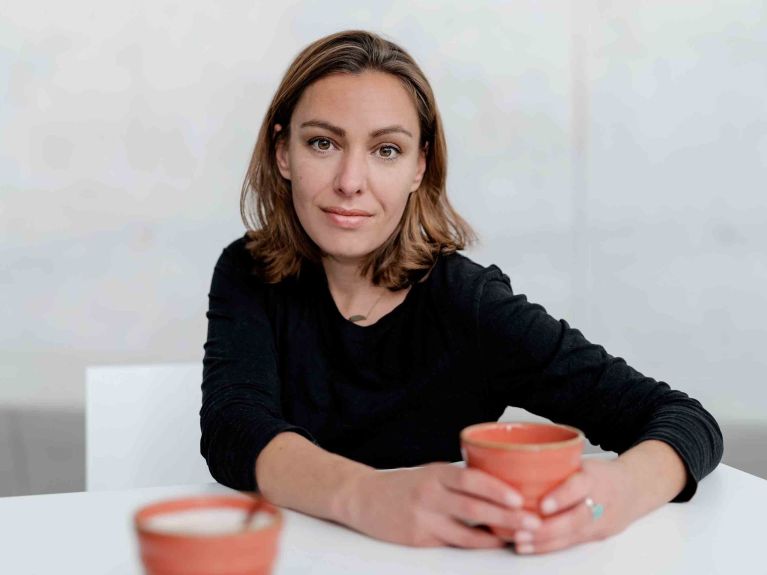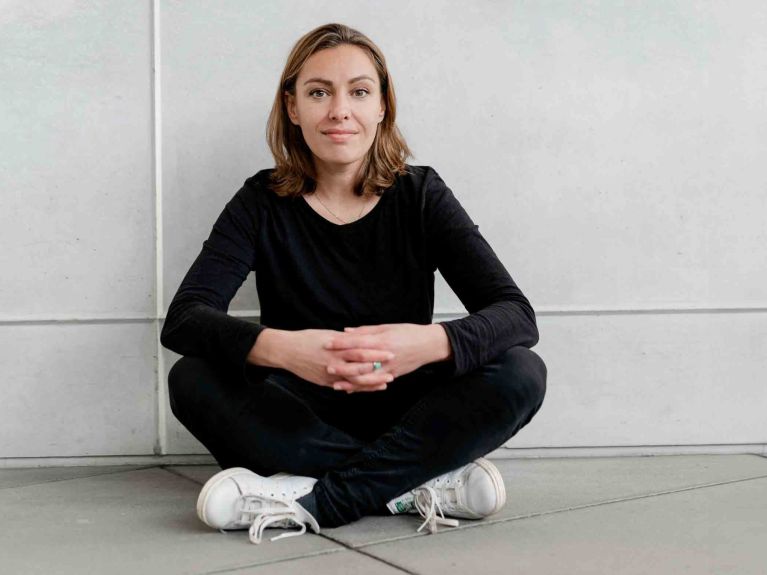“Recognising the suffering of the others”
Joana Osman is a German-Palestinian writer and peace activist. Here she talks about the current escalation, literature and peace.

Joana Osman is a German-Palestinian writer and peace activist. Her family on her father’s side is from Jaffa, once a harbour town in the British Mandate of Palestine and now the Arab quarter of the Israeli city of Tel Aviv-Jaffa. In her novels, Osman describes her turbulent family history, while in her peace work at the Peace Factory she campaigns for understanding between Palestinians and Israelis.
Ms Osman, one of the things your books deal with is the recent history of the Middle East, which is also part of your own personal life story. What exactly are your novels about?
My debut novel “Am Boden des Himmels” is about a young Arab-Israeli journalist who is sent out in search of an urban legend. According to this, an angel has been sighted in Israel who has the ability to make everyone he meets suddenly become devoted to peace. The angel helps people view the conflict from the perspective of the other side. This then leads to all kinds of things happening. Here I draw on a lot of what I experienced myself while travelling in the Middle East and in the course of my peace work, including conversations with both Israelis and Palestinians.
My current novel “Wo die Geister tanzen” is a fictionalised version of the history of my own Palestinian family. My father and my uncle gave me diaries in which they describe their childhood: on the run, in the diaspora and in abject poverty. This taught me a lot about my family history. I fictionalised anything I didn’t know or was unable to find out. The book is also about myself and my search for my family history, about the encounters I’ve had with my family in the Middle East, with my Israeli friends and my Palestinian family.
Why do you believe literature is a good way of approaching the conflict?
All stories work with emotions, otherwise they wouldn’t be stories. And good storytelling – good literature – is capable of arousing emotions and engaging with what readers themselves feel. I believe that if the only input we have is political information or news, we lack this emotional connection. Personal stories allow people to engage at a completely different, more emotive level, as do fictional narratives.
You’re a peace activist: you give talks, run workshops at schools and work at the Peace Factory. What exactly do you try to achieve?
The aim is to get people from conflict regions to engage in dialogue with each other, especially from Israel and Palestine. This conflict in particular involves a powerful “dehumanisation” of the other side. What we do is to try to “rehumanise” people again, for example by publishing their personal stories and getting them to talk to each other.
What feedback do you get?
The feedback is overwhelmingly positive. These workshops have given rise to friendships between Israelis and Palestinians that have lasted to this day. I’m still in contact with people who have formed close-knit groups of friends. In my bubble, I only know Israelis and Palestinians who like each other. They’re trying to reach out to each other in the current conflict, too.

This raises the most important question: how do you feel right now and how have you experienced the violence of the last few months?
I think that what I’ve been feeling is much the same as what a lot of others have been through who have connections in the region. It’s been a huge shock, and one that I still feel now. I don’t think I’ve really come to terms with what happened and what is still going on. I’m very afraid for my friends and relatives in Lebanon. I have friends in the Gaza Strip who might not even be alive. I have friends in Israel who suffered as a result of the terrorist attack, too. That’s difficult to process. But at the same time I have my day-to-day life in Germany, too – I have to go on functioning.
Dieses YouTube-Video kann in einem neuen Tab abgespielt werden
YouTube öffnenThird party content
We use YouTube to embed content that may collect data about your activity. Please review the details and accept the service to see this content.
Open consent formYou actively campaign for mutual understanding. How has the discourse changed as a result of the current war?
It’s extremely important for people to engage in dialogue with each other, and that’s happening much less at the moment. We’re seeing a polarisation: people think that showing solidarity with one side means denying the suffering of the other side. That’s extremely dangerous. People who take a pro-Palestinian stance, but at the same time don’t say a word about the massacre, the Jewish suffering or the trauma of anti-Semitism because they feel they’d be betraying the Palestinian cause. This isn’t helpful at all: it makes you part of the problem, not part of the solution. And vice versa: if you take a pro-Israeli stance and at the same time ignore or even justify the war in Gaza and the thousands of civilians killed – including huge numbers of children – that’s equally unhelpful. There’s no point in ignoring the suffering of the other side just because you desperately want to show solidarity with one side. The important thing here is to see that both sides have been going through an unimaginable trauma for a very long time – and it’s still ongoing.
A lot of people are now starting to lose hope that a peaceful future is even possible. Where do you find the strength to campaign for peace?
What gives me hope is that I know so many Israelis and Palestinians who feel connected – not in enmity but in friendship. I know these people exist because they are personal acquaintances of mine. I know how intensely they are committed to peace and understanding. I know we can’t give up now. I know we have no choice, otherwise more and more people will die. In the end there must be peace, in the end there will be peace. The only question is how long it will take.



